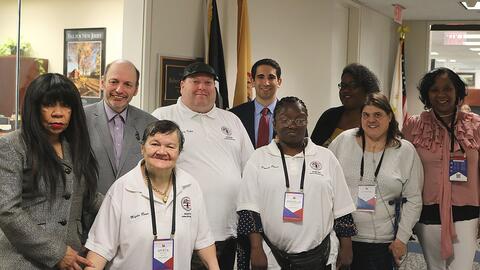Developmental Disabilities Awareness Month, now also recognized in New Jersey in 2021 with a proclamation from Governor Phil Murphy.
Advocates at Community Access Unlimited are reminding the community that people with disabilities continue to fight for accessibility and inclusion in our country. CAU is a Union County-based, statewide nonprofit that works to integrate people with disabilities and youth at risk into the general community through comprehensive supports.
Developmental Disabilities Awareness Month was first recognized in 1987 by President Ronald Reagan, after the deinstitutionalization movement of the seventies and early eighties had laid the groundwork for social change necessary for people with developmental disabilities to reach their potential.
The New Jersey proclamation recognizes that approximately 133,000 children and adults in New Jersey have an intellectual or developmental disability, and gives credit to the resilience of these residents and caregivers through the COVID-19 pandemic.
“I think a lot of people are happy they’re getting vaccinated but they still can’t go back to work,” said CAU member Joyce Cargle, adding that some people either can’t find work or are waiting to return to their jobs. “I’m kind of frustrated too, because I can’t work at my cleaning job.”
Many people with disabilities in New Jersey are also anxiously awaiting a reopening of day programs.
Cargle is a member of the New American Movement for People with Disabilities, a movement formed at CAU in 2012 and committed to social, political and economic transformation for the equity of all Americans.
NAMPD has continued to meet virtually during the pandemic, and members have spoken publicly on issues affecting people with disabilities.
Both Cargle and NAMPD co-founder Gary Rubin oppose a NJ bill that would allow cameras inside residential programs for people with disabilities if the people living at that program give their consent.
“We should refuse to live like that,” said Rubin, who has testified publicly against the bill.
NAMPD members have also given testimony to the NJ Senate Transportation Committee to address issues of reliability, capability and flexibility with public and specialized transportation.
“We should also have more accessibility at residential programs for people in wheelchairs,” Cargle said. “When you go to the doctor’s office and the door is small that’s not good. You should be able to roll up there. I think there should be more accessibility in restaurants, stores and schools.”
Walter Kalman, advocate for families and communities and director of advocacy at CAU, said that part of his work includes helping families understand and practice supported decision-making, so that people with disabilities can speak for themselves as much as possible, including on issues such as the “camera bill.”
“We need to be treated the way you want to be treated,” said Rubin. “Everybody who is different should be treated the same.”
Union County Board of Commissioners Chairman Alexander Mirabella acknowledged the work happening at CAU throughout the difficulties of the pandemic:
“The Governor's proclamation recognizes that the COVID-19 pandemic has created enormous new challenges for people with developmental disabilities, and for the community of family members, caregivers and advocates. Community Access Unlimited has been an invaluable partner in the efforts to ensure that developmentally disabled residents are able to connect with their community during the crisis, and on behalf of the Board I would like to thank them for their unstinting work.”
To learn more about CAU, visit www.caunj.org or follow the agency on Facebook, Twitter and Instagram. Learn more about supporting the agency and become a monthly donor at www.caunj.org/support-us/.
